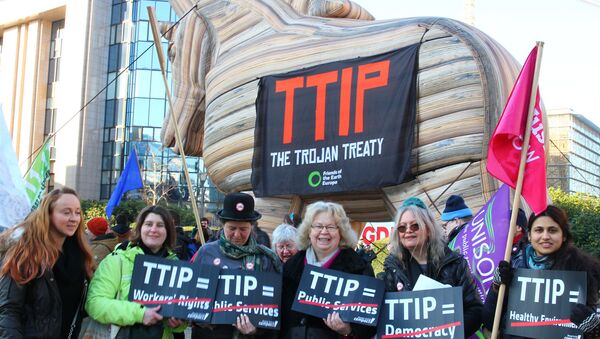Gabriel's statement on Saturday that the TTIP negotiations are de facto dead were followed by French Minister of State for Foreign Trade Matthias Fekl's announcement on Tuesday that Paris would call for a halt to the current negotiations on the TTIP.
"We fear that a new US administration – or indeed, French or German — may well resurrect TTIP, likely under a different name. TTIP is not tied to any individual, but is the product of neoliberalism and the championing of big business profits above all else," Mark Dearn, a senior trade campaigner with the War on Want charity, said.
Contrary to German and French officials, Italian Minister of Economic Development Carlo Calenda said on Tuesday that the TTIP deal would happen eventually.
"We will see the TTIP proponents striking back," Katharina Reuter, a member of the board of the SME (Small and Medium Enterprises) against TTIP, told Sputnik. "Seemingly dead free trade agreements are not dead, until the negotiations are not stopped officially. Negotiations will still go on, but hidden from the public eye," Reuter noted.
The representatives also warned that the debate on TTIP's death is just a cover for the continuation of the equally harmful Comprehensive Economic Trade Agreement (CETA) the European Union is negotiating with Canada.
"Opposing TTIP rings a little hollow when the same EU governments are still trying to force through the ‘Canadian TTIP,' CETA, which could allow tens of thousands of North American corporations to sue the UK for up to 20 years after Brexit," Dearn said.
Similarly, Reuter noted that "the whole debate seems 'fake' because at the moment we should rather be talking about CETA. Gabriel is trying to keep the people quiet, when he says that TTIP has failed and doesn't talk at all about what will happen with CETA."
Reuter said that many SMEs rejected free trade agreements such as TTIP and Ceta but it did not mean that they were generally opposed to free trade.
"But standards should rather be set at institutions such as the International Organization for Standardization (ISO). The target for a fair world trade is rather multilateral or global agreements instead of bilateral agreements such as TTIP," Reuter said.
TTIP seeks to establish a free trade zone between the United States and Europe. The US government started discussions on the draft deal with the European Union in 2013. The details of TTIP, including specific rules of market access, have not been released to the public.




